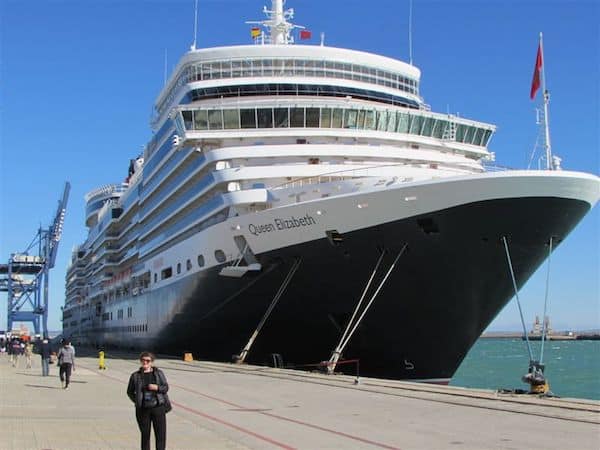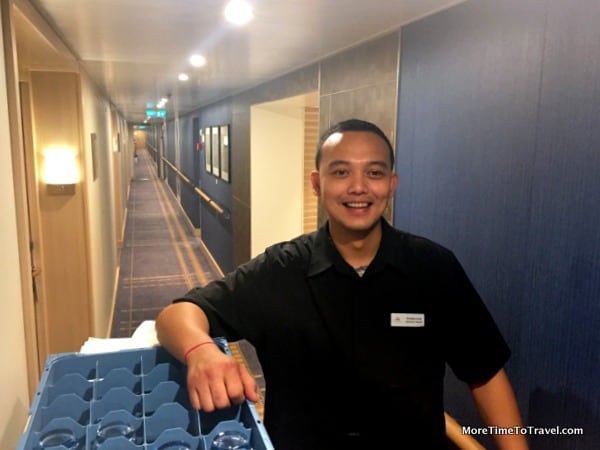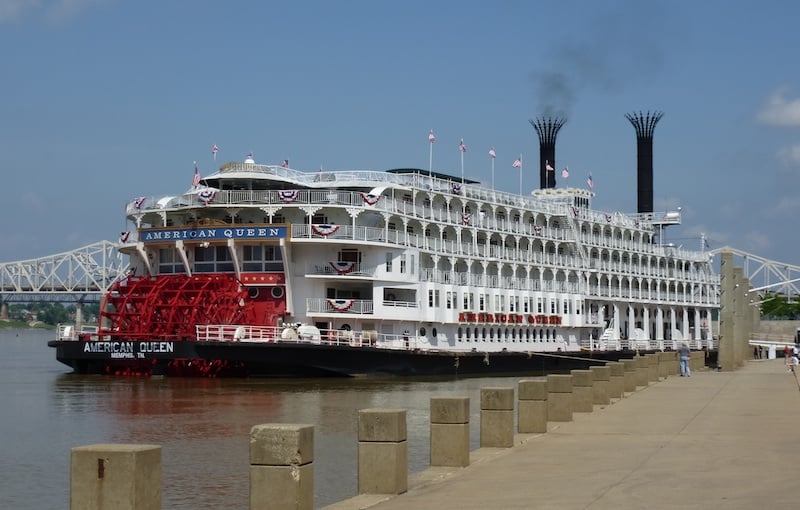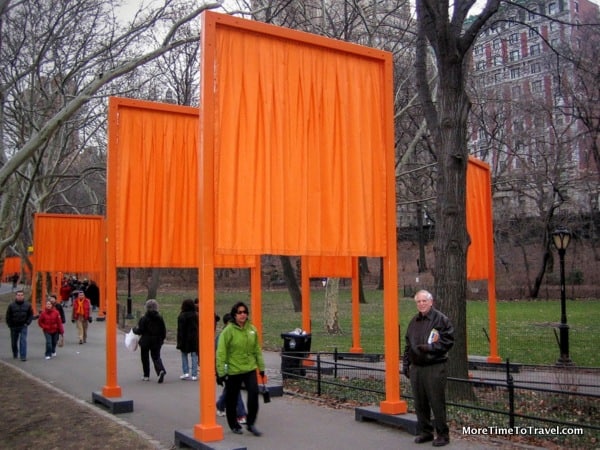Cruising on Queen Elizabeth: The Cunard Way

Guest contributors John and Sandra Nowlan cruise from Southampton to Spain, Portugal and Gibraltar on Cunard’s Queen Elizabeth.
No cruise line has managed to keep so many of its traditions alive as has Cunard.
Steeped in history
Sure, the company founded by Nova Scotia shipping magnate Samuel Cunard is now owned by Carnival Corporation and has adopted many of the attributes – good and bad – of modern cruise ships. But Cunard, with its own management team, is a step apart.
The Cunard flagship, Queen Mary 2, is, of course, the world’s only true ocean liner built for rough seas and long distances. But its two smaller sister ships, Queen Victoria and Queen Elizabeth, retain the Cunard heritage and leave no doubt when you step aboard that you’re part of a unique fleet.
The newest Queen
We joined the newest Queen, Elizabeth, completed in 2010, on an outstanding 10-day itinerary from Southampton to ports in Spain, Portugal and Gibraltar. Like the famous Queens of past decades, Elizabeth, with its 2000 passengers, keeps the British class system intact with separate and exclusive suites and dining areas for Queens Grill and Princess Grill guests.
But, except for private lounges, the majority of guests (Britannia Class) share sophisticated and comfortable public areas like the Royal Court Theatre (built to resemble a vast, West End showplace), the Queen’s Room (for Big Band music, classical concerts, dancing and tea), the excellent two-story library, the Sports Deck (including croquet, deck tennis and bowls), the swimming pool and many specialty restaurants.



In spite of the class structure, there’s nothing third-rate about the basic accommodations and dining for the 90% of guests in Britannia Class. Our stateroom had plenty of storage space, a very comfortable queen-size bed, great lighting and a flat screen TV with many choices including music, movies, Cunard lectures, and front and rear camera views. It had British and American news channels but strangely, no CNN. The bathroom was compact (a tiny but effective shower) but well-lit with high-end toiletries (a brand with Royal approval from Prince Charles).
Dining onboard
The elegant, Art Deco inspired Britannia Dining Room, serving the majority of guests, uses Wedgwood China, has two sittings (6:00 and 8:30 pm); and offers a surprisingly wide menu of choices. The beef dishes (Beef Bourguignon, Beef Wellington, Prime Rib) were especially tasty but the lamb, pork, duck, shrimp and chicken were also excellent. There were vegetarian options every day and the dessert menu reflected Queen Elizabeth’s British heritage – Bakewell Tart, Spotted Dick, Bread & Butter Pudding, Jamaica Rum Cake.

We took advantage of two extra-cost dinner options and found them to be superb. The Verandah ($35 per person) features contemporary French cuisine beautifully prepared and flawlessly served. Even better was “Select Dining” ($17.50 per person) at the rear of the Lido Buffet every evening. Each menu (American Smokehouse, Italian) lasts for three nights. We chose the Asian evening and were blown away by the Bento Box, the Malaysian Chicken and the array of Asian desserts.
The Lido Buffet on Deck Nine is well laid out and rarely crowded. Breakfast includes all the traditional North American dishes but we especially enjoyed the British choices – kippers, smoked haddock, marmite, black pudding. The coffee was just okay – better than on most cruise ships – but, as expected on a ship filled with Brits, there were many choices of tea.

A touch of class
Cunard attracts an older audience and retains the formality that has always been part of British life. There were three formal nights on our cruise with tuxedos and long gowns on most men and women. Even on the other “Informal” nights, men were expected to wear a jacket to dinner. Smoking is restricted to two small areas on the outer decks and, surprisingly, lighting up is also prohibited in the casino.
As we usually do, we arrived in Britain a day before the cruise and stayed at an excellent small hotel in Covent Garden. The One Aldwych, adjacent to London’s West End theatre district, was constructed in 1907 in Edwardian style, and includes 105 tastefully decorated rooms and suites plus a first-rate restaurant.
Sailing Queen Elizabeth from Southampton to Spain and Portugal
We were reluctant to leave for Southampton but the itinerary ahead was as interesting as London itself. Our Captain on Queen Elizabeth, Inger Klein Thorhauge, was the first female commander in Cunard’s history (but not the first at sea; that honour belongs to Royal Caribbean) and, as we discovered, she combined excellent leadership and seamanship with great social skills.

Each stop on our southern journey took us to some remarkable ports:
* La Coruna, Spain, in the northwest corner of the country, is close to a major goal of medieval pilgrims, Santiago de Compostela. The cathedral here, built between the 11th and 13th centuries, is reputed to hold the beheaded remains of Saint James the Apostle. Visitors can walk down a small staircase to view the tomb.
* Cadiz, Spain. We found the remains of an ancient Roman Theatre (1st Century, BC) to be fascinating. Now undergoing restoration, it was only discovered in 1980.

* Malaga, Spain. Birthplace of Picasso, the city honors him with an outstanding museum dedicated to his career. His early paintings (standard portraits) are remarkable because of the contrast with his later, more famous works.

* Gibraltar. In this little piece of Britain (helmeted bobbies, pillar boxes and traditional pubs), we chose a tour called “Fortress Gibraltar” taking us into miles of tunnels carved into the rock for defensive purposes (more than 50 miles have been found). Digging began in 1779 but most of the work (using Canadian mining technology) took place during World War II. En route to the tunnels, we stopped for a close-up look at the famous Barbary Apes (Macaques monkeys) that make their homes on the high cliffs.


* Lisbon, Portugal. In the 16th Century, thanks to its seafaring conquests, this was one of the richest cities in the world. We took a Hop-On /Hop-Off bus tour through the oldest section, Alfama, full of narrow, cobbled streets, ancient churches and interesting shops. We found, and devoured, a couple of custard tarts with flaky pastry that only the Portuguese do so well.

Two days after leaving Lisbon and enjoying all the amenities on Queen Elizabeth, we were back in Southampton. Because we stayed in Europe throughout this cruise, there was no Customs and Immigration procedure, just fond farewells to our new found friends and an efficient debarkation. All in all, an ideal cruise.

All photo credits: John and Sandra Nowlan
*John and Sandra Nowlan are travel and food writers based in Halifax, Nova Scotia
Disclosure: The authors were guests of Cunard Cruise Line. Any opinions expressed in this post are their own.
IF YOU GO
- Previously on MoreTimeToTravel: Cheating Time on the Queen Mary 2






Wow — what an amazing trip – a dream! Putting this one on my wish list too.
Hello Cindy,
Glad you enjoyed the article. Put Queen Mary 2 and Queen Victoria on your wish list as well.
John and Sandra